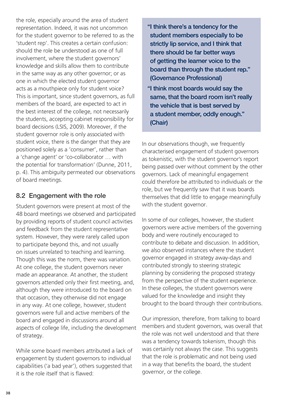
38
the role, especially around the area of student
representation. Indeed, it was not uncommon
for the student governor to be referred to as the
'student rep'. This creates a certain confusion:
should the role be understood as one of full
involvement, where the student governors'
knowledge and skills allow them to contribute
in the same way as any other governor; or as
one in which the elected student governor
acts as a mouthpiece only for student voice?
This is important, since student governors, as full
members of the board, are expected to act in
the best interest of the college, not necessarily
the students, accepting cabinet responsibility for
board decisions (LSIS, 2009). Moreover, if the
student governor role is only associated with
student voice, there is the danger that they are
positioned solely as a 'consumer', rather than
a 'change agent' or 'co-collaborator … with
the potential for transformation' (Dunne, 2011,
p. 4). This ambiguity permeated our observations
of board meetings.
8.2��Engagement�with�the�role
Student governors were present at most of the
48 board meetings we observed and participated
by providing reports of student council activities
and feedback from the student representative
system. However, they were rarely called upon
to participate beyond this, and not usually
on issues unrelated to teaching and learning.
Though this was the norm, there was variation.
At one college, the student governors never
made an appearance. At another, the student
governors attended only their first meeting, and,
although they were introduced to the board on
that occasion, they otherwise did not engage
in any way. At one college, however, student
governors were full and active members of the
board and engaged in discussions around all
aspects of college life, including the development
of strategy.
While some board members attributed a lack of
engagement by student governors to individual
capabilities ('a bad year'), others suggested that
it is the role itself that is flawed:
In our observations though, we frequently
characterised engagement of student governors
as tokenistic, with the student governor's report
being passed over without comment by the other
governors. Lack of meaningful engagement
could therefore be attributed to individuals or the
role, but we frequently saw that it was boards
themselves that did little to engage meaningfully
with the student governor.
In some of our colleges, however, the student
governors were active members of the governing
body and were routinely encouraged to
contribute to debate and discussion. In addition,
we also observed instances where the student
governor engaged in strategy away-days and
contributed strongly to steering strategic
planning by considering the proposed strategy
from the perspective of the student experience.
In these colleges, the student governors were
valued for the knowledge and insight they
brought to the board through their contributions.
Our impression, therefore, from talking to board
members and student governors, was overall that
the role was not well understood and that there
was a tendency towards tokenism, though this
was certainly not always the case. This suggests
that the role is problematic and not being used
in a way that benefits the board, the student
governor, or the college.
"�I�think�there's�a�tendency�for�the�
student�members�especially�to�be�
strictly�lip�service,�and�I�think�that�
there�should�be�far�better�ways�
of getting the learner voice to the
board than through the student rep."
(Governance�Professional)
"�I�think�most�boards�would�say�the�
same,�that�the�board�room�isn't�really�
the�vehicle�that�is�best�served�by�
a�student�member,�oddly�enough."�
(Chair)